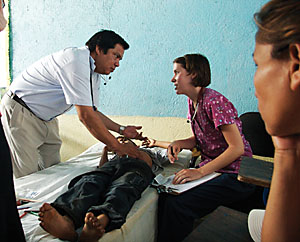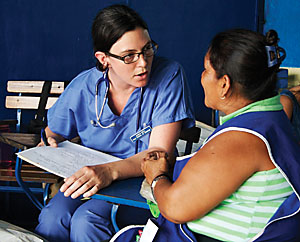 | Yale School of Nursing student Cassandra Jones examines a child with Ministry of Health physician Dr. Jose Felix Sanchez, chief of medical services at the national children's hospital in Managua, who volunteers his time for the YSN effort. |
This article originally appeared in Yale Nursing Matters, a publication of
the Yale School of Nursing and the Yale Nursing Alumnae/i Association. The
publication can be found online at http://nursing.yale.edu/News/Publications/YNM.
— By Daniel Champagne
T H I S
Meeting the challenges of
nursing care in Nicaragua
Patricia Jackson Allen, a professor at the Yale School of Nursing (YSN), had
a plan in mind for showing the children of Managua, Nicaragua, how to protect
themselves against lice.
She was going to teach them how to properly shampoo their heads, but then she
realized once the children went back home, their siblings or parents would
just spread the lice right back to them.
She was going to teach them to properly wash their bed sheets, but then she
realized many of the children weren’t sleeping on sheets, but on pieces
of cardboard on the floor.
And suddenly Allen realized something else. In order to make a change in this
area of the world, she would need to change her style of teaching. “It
challenges us all to think creatively, but also to really understand the public
health implications of working in that country,” says Allen, who is the
director of the pediatric nurse practitioner specialty at YSN.
Overcoming those initial challenges is one of the most difficult parts of beginning
a new international project such as the one that seven YSN students and four
faculty members started at a small school in Managua in May 2006.
Allen and Susan Barringer, associate director of YSN’s Center for International
Nursing Scholarship and Education, trav?eled to the area last January to see
if the project would be beneficial for both the students at YSN and the students
at La Escuelita, a concrete, three-room, privately founded school with an enrollment
of 90 students ages 3 to 18.
While YSN has been involved in community health projects in Nicaragua since 2002,
the relationship with La Escuelita may never have come to be if not for a chance
meeting between an American and a YSN alumna already making a difference in the
area.
Alumnae Angie Rogers ’00 M.P.H., ’03 M.S.N. and Bethany Golden ’03 M.S.N. created a non-profit organization
for human rights projects and women’s health initiatives in Nicaragua in
2002. Their work, which was profiled in Nursing Matters in the winter of 2003,
began in support of the Mama Liche Clinic in Esteli, a women’s health clinic
run by local resident Alicia Fuente out of her home. Once a year, six community
health students from YSN volunteer at the clinic in Esteli.
On a bus in Nicaragua in 2006, Golden met someone who told her about La Escuelita
and its health care needs. News of the little school soon made its way back to
New Haven. Penn Garvin, an American with a history of health advocacy, is the
contact person for YSN in Managua.
Three Nicaraguans created the school in 1995 as a way to educate children of
people who worked in the Oriental Market, a large section of town with bustling
street commerce. The school’s creators are not trained teachers, but they
are educated.
Barringer says the area is much poorer and less developed than she expected.
A massive earthquake devastated the downtown area of Managua in 1972 and it was
never completely rebuilt, according to Barringer. Then in 1998, another hurricane
destroyed much of the area’s agriculture, she says.
“Most of the children whose parents work in the Oriental Market could not
afford to go to public schools because they simply didn’t have the money
to pay for the required uniforms. As a consequence, these children were not getting
health services and they were not getting education,” Barringer adds.
Once La Escuelita was established, the teachers found that they were also quickly
becoming the primary health care resources for their students. As issues arose,
the teachers would scramble to find the answers and counsel the students and
their parents, according to Barringer. “The teachers try to address these
health issues, but they just can’t because they aren’t trained health
care providers,” she says.
When the YSN’s Niacaragua Project members arrived in May, they brought
toothbrushes, toothpaste and vitamins for the children of La Escuelita. Lack
of oral hygiene was one of the most common problems seen at the school. A local
dentist who knew of the project volunteered her time each day to give all of
the children basic dental exams and cleanings. The children were also taught
dental hygiene.
Roughly one-third of the students had lice and more had skin diseases and parasites.
The group was able to bring in parasite medication within a few days.
Fifteen students had signs of upper respiratory disease with symptoms consistent
with asthma. A local clinician heard of the efforts by YSN and brought in 15
Albuterol inhalers. Unfortunately, the students had a difficult time adjusting
to their new devices. So Allen tried to obtain spacers, which are attachments
for the inhaler that allow children to breathe in the proper amount of Albuterol.
There were none in the area, and, once again, Allen had to change her plans.
She instructed the YSN students to make their own spacers out of plastic juice
bottles and the 15 children with asthma symptoms quickly had a bit of relief.
Allen says, “Before the inhalers, the parents of these children with asthma
simply had to wait out the attack and hope it was not too serious. Now they could
use the inhalers to treat attacks and will have to resort to emergency medical
care much less frequently.”

One major undertaking of the Yale School of Nursing Nicaragua Project was creating health records for each child in the school, which not only helped with treatment but helped families get health benefits. Here, YSN student Jenner Greil speaks with a mother about her child.
As the YSN Nicaragua Project continued, more local clinicians came forward and offered their services to the students.
A community health brigade stepped in along with the Ministry of Health. Members
of YSN also met briefly with faculty and students from the School of Nursing
at the Polytechnic University in Managua who have offered to help at the school.
By the end of the week, all 90 of the students in La Escuelita, including a few
additional walk-in patients, had been given a health assessment.
One of the largest and most important undertakings of the group while in Managua
was creating health records for each child in the school. “When we arrived,
we found only six records of any immunizations at the school and those records
were in tatters,” Allen explains.
The YSN Nicaragua Project then worked with the Ministry of Health to put together
cards for the children so their teachers and local clinicians would be able to
see their health care history before they are treated. Barringer explains that
a birth has to be registered in order to get certain benefits through the Ministry
of Health system, but in poorer neighborhoods, families may not have been registered
for several generations. “This project created the records these families
will need in order to get care,” she says.
The cards will also allow YSN students and faculty to see the progress of students
as they continue to visit La Escuelita year after year. “I think the experience
over time will be that as we continue to watch individual students, we will also
be seeing YSN’s relationship with La Escuelita grow,” Barringer says.
For the nursing students who take part in the YSN Nicaragua Project as it moves
forward, Barringer also sees a benefit. She says, “I think it’s a
richer experience for the students because that’s how change really happens.
It doesn’t happen in a one-week visit to observe something. It takes time.”
Even with yearly visits, the project’s plan was always to give the teachers
in Managua enough information so they could guide their students’ efforts
in basic hygiene and health throughout the year by reinforcing behaviors such
as hand washing and checking for lice. The YSN group also gave the teachers a
copy of “Where There Is No Doctor: A Village Health Care Handbook,” which
Barringer described as “the bible for community health and rural health
care providers.”
“Teachers are very interested in it,” Barringer says. “They
don’t want to become primary health care providers, but they also understand
that as the teachers, they play a huge role in the lives of these children.”
According to Barringer, building long-lasting and mutually beneficial relationships
is just as important as the health care itself. She says, “These trips
are not a one-shot deal or simply a line on a resume. These initial trips are
about building up trust with people who are inviting others into their private
lives even though they may come from vastly different cultures and don’t
speak the same language.”
That trust, Barringer feels, can be developed only by continuing to visit the
area and providing basic health care to the people of Managua. “We went
down there and said a lot in January, but they were probably wondering if we
were going to deliver,” she says. “Well, we did. Now they’re
probably wondering if we’re going to come back. Yes, we’re going
to come back. You build this trust over time. We’re not just going to observe
and look around. We’re going to offer something because we really believe
that we have a lot to offer.” W E E K ' S
W E E K ' S S T O R I E S
S T O R I E S![]()
 Yale cuts costs for families and students
Yale cuts costs for families and students![]()
![]()
 Homebuyer benefit increased
Homebuyer benefit increased![]()
![]()
 Fossil solves mystery of extinct animal's origins
Fossil solves mystery of extinct animal's origins![]()
![]()
 Team learns Abu Dhabi desert once lush habitat
Team learns Abu Dhabi desert once lush habitat![]()
![]()
 Meeting the challenges of nursing care in Nicaragua
Meeting the challenges of nursing care in Nicaragua![]()
![]()
 Foundation’s gift to the School of Drama establishes . . .
Foundation’s gift to the School of Drama establishes . . .![]()
ENDOWED PROFESSORSHIPS
 Marans has been appointed as Harris Professor
Marans has been appointed as Harris Professor![]()
 Medzhitov named first incumbent of Wallace chair
Medzhitov named first incumbent of Wallace chair![]()
 State is designated as Cohen Associate Professor
State is designated as Cohen Associate Professor![]()
![]()
 Study: Despite efforts, racial disparities in cancer care continue
Study: Despite efforts, racial disparities in cancer care continue![]()
![]()
 Law School students argue case before the nation’s highest court
Law School students argue case before the nation’s highest court![]()
![]()
 Sharp cited as ‘superb teacher of teachers’
Sharp cited as ‘superb teacher of teachers’![]()
![]()
 Events commemorate Martin Luther King Jr. Day
Events commemorate Martin Luther King Jr. Day![]()
![]()
 The color printmaking revolution is highlighted in new exhibition
The color printmaking revolution is highlighted in new exhibition![]()
![]()
 Symposium to examine the university’s role as architectural patron
Symposium to examine the university’s role as architectural patron![]()
![]()
 Forum will explore the use of neuroimaging in study of alcoholism
Forum will explore the use of neuroimaging in study of alcoholism![]()
![]()
 Memorial Service for George Hersey
Memorial Service for George Hersey![]()
![]()
 Yale Books in Brief
Yale Books in Brief![]()
![]()
 Campus Notes
Campus Notes![]()
Bulletin Home |
| Visiting on Campus
Visiting on Campus |
| Calendar of Events
Calendar of Events |
| In the News
In the News![]()
Bulletin Board |
| Classified Ads
Classified Ads |
| Search Archives
Search Archives |
| Deadlines
Deadlines![]()
Bulletin Staff |
| Public Affairs
Public Affairs |
| News Releases
News Releases |
| E-Mail Us
E-Mail Us |
| Yale Home
Yale Home